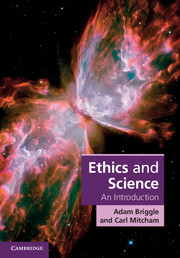Book contents
- Frontmatter
- Contents
- List of figures and tables
- Preface
- 1 Introduction and overview
- 2 Ethical concepts and theories
- 3 Science and its norms
- 4 Research ethics I
- 5 Research ethics II
- 6 Research ethics III
- 7 The science of ethics
- 8 Transition
- 9 Science and politics I
- 10 Science and politics II
- 11 Science and ideational culture
- 12 Science applied
- Epilogue Looking back, leaning forward
- Appendix Ethics codes
- Bibliography
- Index
Epilogue - Looking back, leaning forward
The moral character of scientists
Published online by Cambridge University Press: 05 November 2012
- Frontmatter
- Contents
- List of figures and tables
- Preface
- 1 Introduction and overview
- 2 Ethical concepts and theories
- 3 Science and its norms
- 4 Research ethics I
- 5 Research ethics II
- 6 Research ethics III
- 7 The science of ethics
- 8 Transition
- 9 Science and politics I
- 10 Science and politics II
- 11 Science and ideational culture
- 12 Science applied
- Epilogue Looking back, leaning forward
- Appendix Ethics codes
- Bibliography
- Index
Summary
By way of conclusion, let us briefly meditate on a central paradox in the development of modern science. We first state it bluntly and then unpack it a bit, but we intentionally leave loose ends to discourage any temptation to think there are easy answers.
Here is the paradox. When science was a more personal matter, conducted by amateurs on the margins of society, scientists were imbued with a more public sense of responsibility. But just when science became more public – when it was enrolled into institutions of commerce and politics, money and power – scientists shrunk their sense of responsibility. In short, just when science became a powerful social force scientists became parochial laborers, responsible only to a narrow community of disciplinary peers. This mismatch, we believe, must be rectified. Scientists must reclaim a broader moral responsibility and rediscover a sense of science as a higher calling, a vocation, and not just another job.
- Type
- Chapter
- Information
- Ethics and ScienceAn Introduction, pp. 319 - 323Publisher: Cambridge University PressPrint publication year: 2012

